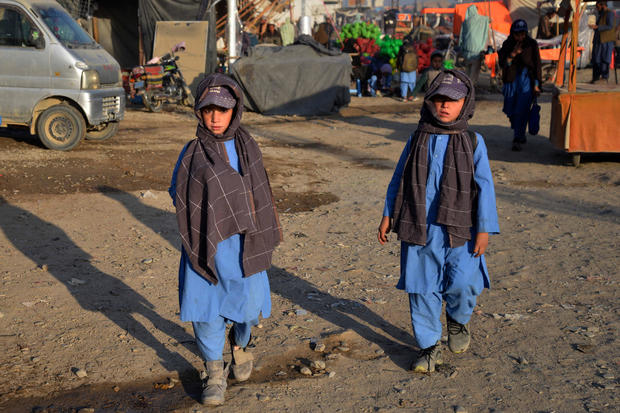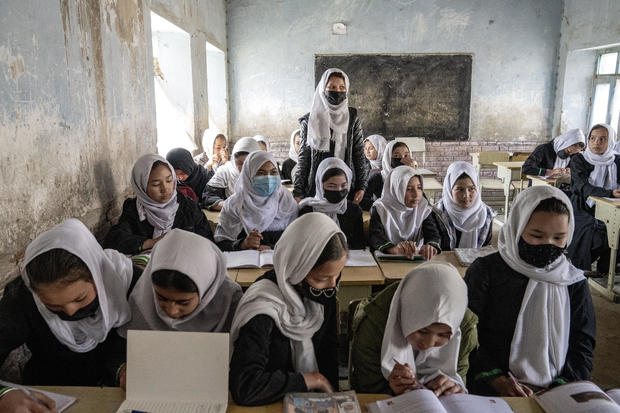
The report warns that the “permanent harm” inflicted upon boys and girls attending Taliban schools will have long-lasting consequences for Afghanistan’s future.
The U.S. Treasury announced new sanctions over the weekend against two Taliban regime
Afghanistan’s officials have been accused of playing a part in the widespread mistreatment of women and girls. The Treasury Department specifically pointed out the Taliban’s prohibition on girls continuing their education after sixth grade as a form of severe and widespread prejudice.
But while the
Effect on women and girls in Afghanistan
While the severe restrictions on education imposed by the Taliban have been extensively recorded, a recent report from Human Rights Watch cautions that their methods of schooling are leading to permanent harm for both boys and girls in Afghanistan.
HRW cautions that these policies could lead to a generation of children who are left behind, and will have long-lasting consequences for the future of Afghanistan.
The Dec. 5 report by HRW contains testimonies from teachers and students detailing the changes in schools since the Taliban regained control in Aug. 2021 after the withdrawal of international forces. These changes include a stricter religious curriculum, enforced through reported instances of abuse.
The report contains information about an increase in physical discipline, backward modifications to the curriculum, and the dismissal of female educators from schools for boys.
SANAULLAH SEIAM/AFP/Getty
According to Sahar Fetrat, the author of a report by HRW, the Taliban are inflicting permanent harm on the education system in Afghanistan for both boys and girls. Their actions pose a threat of creating a generation that lacks access to a good education due to the damage done to the school system in the country.
According to HRW, students have described the new rules implemented by the Taliban in schools as “suffocating.” These rules seem to mirror the education system that existed in Afghanistan before the U.S.-led invasion in 2001, signaling a swift return to the conservative practices of the Islamic group.
According to a student interviewed by HRW, wearing bright colors, shorts, t-shirts, ties, or suits is considered unacceptable behavior for students. Bringing a smartphone to school can result in serious repercussions, and listening to music or having music on one’s phone can result in harsh physical punishment. The student also reported that there are frequent incidents of boys being punished during morning assembly or in classrooms for these reasons.
According to the rights group, a different student reported that female teachers who were experts in the subjects they taught were dismissed.
According to the report, the student stated that the previous professionals have left, causing us to feel their absence. In addition, four of our male teachers also left the country in August 2021. Currently, we are being instructed by male teachers who previously taught grades four and five.
The Ministry of Education, under the control of the Taliban, released a statement on social media dismissing the HRW report and urging international organizations to personally assess the conditions in Afghanistan’s schools.
The report stated that there were 245,000 teachers employed by the Ministry of Education, with 95,000 of them being women. It also clarified that no female teachers were terminated from their positions.
The ministry stated that although female teachers were moved from schools for boys, they were not left without work as they were hired at schools for girls.
Sixth grade girls complete their schooling, perhaps for the rest of their lives.
In Afghanistan, the end of the academic year is in December. After completing sixth grade, girls are prohibited from attending classrooms in the Taliban-controlled areas of Afghanistan. Additionally, young women face restrictions.
Universities were off limits for individuals banned by the Taliban.
Excluded from numerous occupations, women were not afforded equal opportunities.including beauty salons.
Shafiqa Khpalwak, an advocate for education in Afghanistan, shared on “Afghanistan International” TV network (located abroad) that a teacher confided in her about students wanting to fail their sixth grade in order to continue attending school, as Khpalwak and the students cried on their last day.
Fetrat stated that the Taliban’s influence on the education system is currently causing harm to children and will negatively impact Afghanistan’s future. It is crucial for the international community to urgently and efficiently take action to address the country’s education crisis.
The United States has imposed sanctions on two high-ranking members of the Taliban.
The United States Treasury announced sanctions on 20 individuals from around the world, including two high-ranking members of the Taliban, for their involvement in human rights violations. This action was taken on International Human Rights Day.
OFAC has implemented financial penalties on Fariduddin Mahmood and Khalid Hanafi due to their involvement in severe human rights violations against women and girls in Afghanistan. This includes restricting access to secondary education based solely on gender, which is a form of widespread discrimination and hinders their right to equal protection.
Ebrahim Noroozi/AP
Hanafi is currently serving as the Minister of Propagation of Virtue and Prevention of Vice for the Taliban. This department holds a lot of influence within the Taliban government and is responsible for enforcing the group’s strict interpretation of Islamic law through monitoring and controlling behaviors in public spaces and government institutions. The treasury has reported that the enforcers of this ministry have committed severe human rights violations, such as murder, abduction, physical punishment, and assault on individuals protesting against restrictions on women’s rights, including access to education.
Mahmood is the acting general director of the Afghanistan Academy of Sciences. Both Hanafi and Mahmood are believed to be close to the Taliban’s supreme leader, and both are against girls’ education.
In a post on social media, Zabihullah Mujahid, the main spokesperson for the Taliban, expressed his disapproval of the U.S. sanctions and stated that using pressure and restrictions is not an effective way to solve problems.
Mujahid, in his written statement in English, stated that past attempts by the United States to use sanctions to alter the Taliban’s policies had been unsuccessful. He criticized the U.S. for being hypocritical and labeled it as one of the major perpetrators of human rights violations.support for Israel.”
More
More
Source: cbsnews.com
